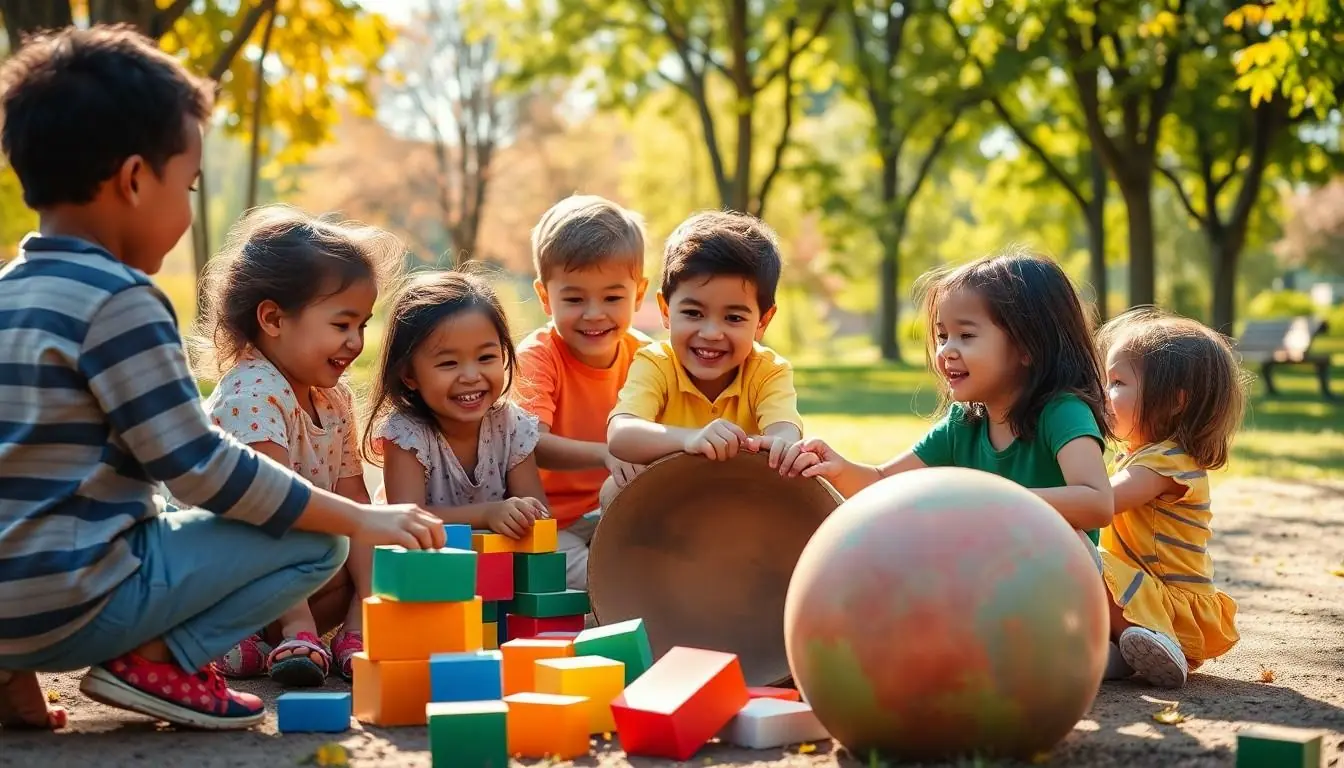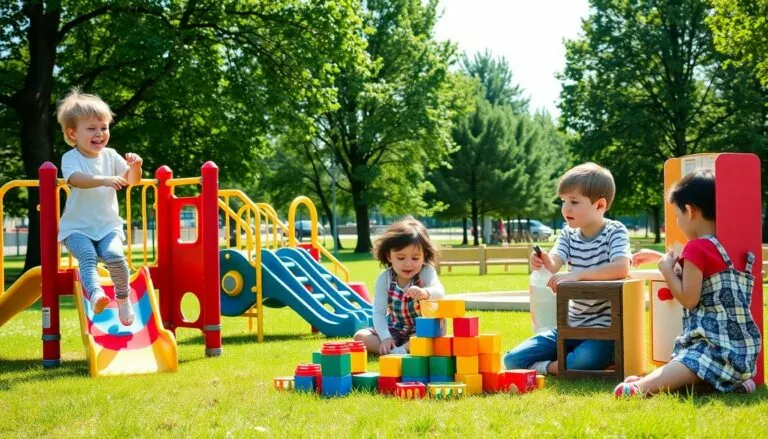Table of Contents
ToggleIn the grand adventure of life, few journeys are as thrilling as child and family development. It’s a wild ride filled with laughter, tears, and the occasional tantrum that could rival a Broadway show. As families navigate the ups and downs of growing together, understanding the ins and outs of this process can make all the difference.
Overview of Child and Family Development
Child and family development encompasses a variety of stages and processes that shape the lives of individuals within a family unit. Emotional, social, and cognitive growth occurs simultaneously, influencing family dynamics significantly. Families often navigate challenges together, providing support and guidance during key developmental milestones.
Children experience rapid development during their early years, primarily focusing on attachment and bonding. Secure attachments foster resilience, enabling children to explore their environments confidently. They thrive in favorable conditions where love and support are prevalent.
Parents play crucial roles in this development. Their interactions directly affect children’s self-esteem and emotional health. Positive reinforcement and consistent communication can nurture strong relationships, enhancing overall family cohesion. Effective parenting skills promote independence while maintaining a secure base for children.
Moreover, cultural factors shape child and family development. Diverse backgrounds introduce varying values and beliefs, enriching family experiences. Understanding these influences helps families adapt and grow together, accommodating different perspectives while forging a united front.
Research indicates that families who engage in shared activities strengthen their connections. Regular family dinners or outings create opportunities for dialogue, enabling members to express feelings and concerns openly. Creating routines can establish a sense of security, which is vital for child development.
Each family encounters unique circumstances, yet certain patterns in development remain consistent. Emotional support and open communication stand out as essential components. Proper understanding of these elements contributes to healthier family dynamics, making a significant impact on children’s growth trajectories.
Stages of Child Development
Child development occurs in distinct stages, each essential for overall growth. Various factors influence these stages, including biological, environmental, and cultural aspects.
Infancy and Toddlerhood
Infancy spans from birth to around 24 months. This stage features remarkable physical growth, with infants typically doubling their birth weight by five months. Cognitive development accelerates as children begin recognizing faces and responding to their names. Parents contribute significantly to this growth through attachment and bonding, creating a sense of security. Effective communication nurtures emotional health during these formative months. Engaging in interactive play enhances cognitive and social abilities, laying the groundwork for future interactions.
Early Childhood
Early childhood occurs from ages 2 to 6, marking a time of increased independence and social skills. Children expand their vocabulary rapidly, learning hundreds of new words each year. During this period, imaginative play becomes crucial, allowing kids to explore their creativity. Social interactions with peers emerge, fostering cooperation and sharing abilities. Parents who model positive social behaviors shape their children’s interactions. Consistent routines offer stability, assisting with emotional regulation during transitions. Understanding these dynamics helps parents support their child’s growth effectively.
Middle Childhood
Middle childhood spans ages 6 to 12, characterized by significant cognitive advances. Children gain the ability to think more logically and understand abstract concepts. Peer relationships take center stage, impacting children’s social development. During this stage, kids typically improve their academic skills, often excelling in subjects like math and reading. Parents who encourage autonomy while providing guidance foster self-confidence. Extracurricular activities introduce teamwork and discipline, enriching their experiences. Overall, this stage solidifies essential skills that continuously influence family dynamics and personal development.
Family Dynamics and Their Impact
Family dynamics significantly shape child and family development. Interactions within a family influence emotional well-being, social skills, and cognitive growth.
Parenting Styles
Parenting styles play a crucial role in shaping children’s behavior and attitudes. Authoritative parents often encourage independence while setting clear expectations, promoting self-esteem among children. In contrast, authoritarian styles may lead to obedience but can inhibit open communication, affecting children’s emotional expression. Permissive parents may foster creativity but can struggle with discipline, leading to challenges in self-regulation. Research indicates that children thrive in environments with responsive, consistent parenting styles, which provide structure and support. Positive reinforcement and nurturing interactions enhance family bonds and overall development.
Sibling Relationships
Sibling relationships impact emotional and social development. Supportive interactions among siblings foster vital skills like empathy and conflict resolution. Close sibling ties often lead to better social adjustment and resilience in childhood. Conversely, rivalry or neglect among siblings can produce negative outcomes, such as increased anxiety or low self-esteem. Encouraging cooperation and shared activities strengthens these bonds, creating lifelong connections. Families that prioritize healthy sibling relationships contribute to a more harmonious family dynamic overall.
The Role of Education in Development
Education significantly influences both child and family development, shaping emotional, social, and cognitive growth. Access to quality education lays a strong foundation for future success.
Early Childhood Education
Early childhood education programs enhance cognitive skills and emotional well-being. Research shows that children who participate in these programs exhibit better academic performance later on. Interactive learning experiences build essential social skills and foster a love for learning. Structured environments support children’s developmental milestones through play and exploration, which is crucial during these formative years.
Importance of Family Involvement
Family involvement in education creates a supportive home environment conducive to learning. Children with engaged parents demonstrate improved academic performance and higher self-esteem. Participating in school activities fosters stronger family bonds and encourages open communication. Parents who collaborate with educators reinforce learning at home, directly impacting their children’s success. Consistent involvement also models positive attitudes toward education, instilling a lifelong love for learning.
Social and Emotional Development
Social and emotional development shapes relationships and interpersonal skills in children. This aspect of development directly influences how children interact with others throughout their lives.
Building Resilience
Building resilience remains essential for children to navigate challenges. Positive experiences during early development foster this trait. Supportive family environments contribute significantly, enabling children to face adversity with confidence. Effective coping strategies emerge through parental guidance and encouragement. Engaging in problem-solving activities offers real-life practice for children. Teaching persistence and adaptability enhances their ability to bounce back from setbacks. Participation in group activities further strengthens resilience by fostering teamwork. Overall, a strong foundation allows children to thrive emotionally in various situations.
The Importance of Emotional Intelligence
Emotional intelligence plays a critical role in a child’s overall development. Understanding and managing emotions enables better social interactions. Recognizing feelings in themselves and others enhances empathy and communication skills. Activities like role-playing and storytelling promote emotional awareness. Parents can model appropriate emotional responses, helping children learn valuable coping mechanisms. Encouraging open discussions about feelings fosters healthy emotional expression. High emotional intelligence correlates with improved relationships and academic success. Developing these skills early contributes to long-term emotional health and well-being for children.
Conclusion
Child and family development is a multifaceted journey filled with growth and transformation. Navigating this path requires understanding the interplay of emotional, social, and cognitive factors that shape individuals within a family. By fostering strong relationships through effective communication and support, families can enhance their dynamics and promote positive outcomes for children.
Engaging in shared activities and establishing routines not only strengthens connections but also provides the security children need to thrive. As families embrace their unique challenges and celebrate milestones together, they create a nurturing environment that fosters resilience and emotional intelligence. Ultimately, prioritizing these elements lays the groundwork for healthier family dynamics and a brighter future for every child.








